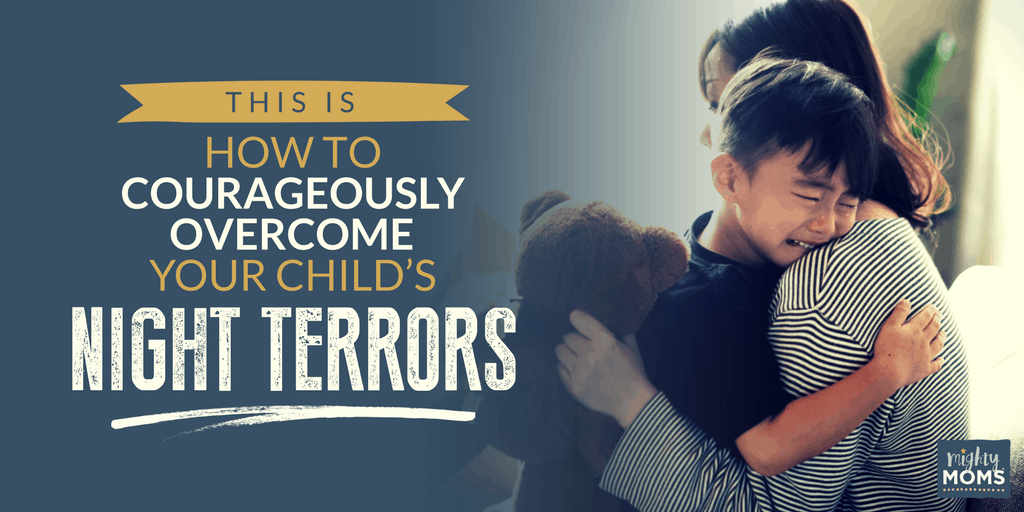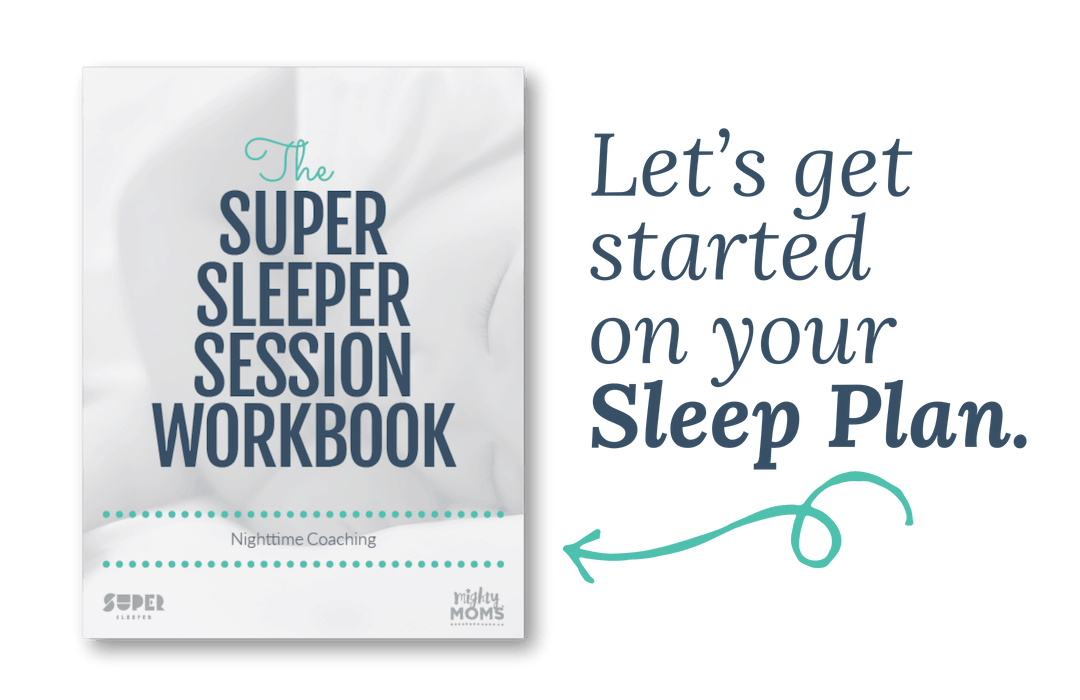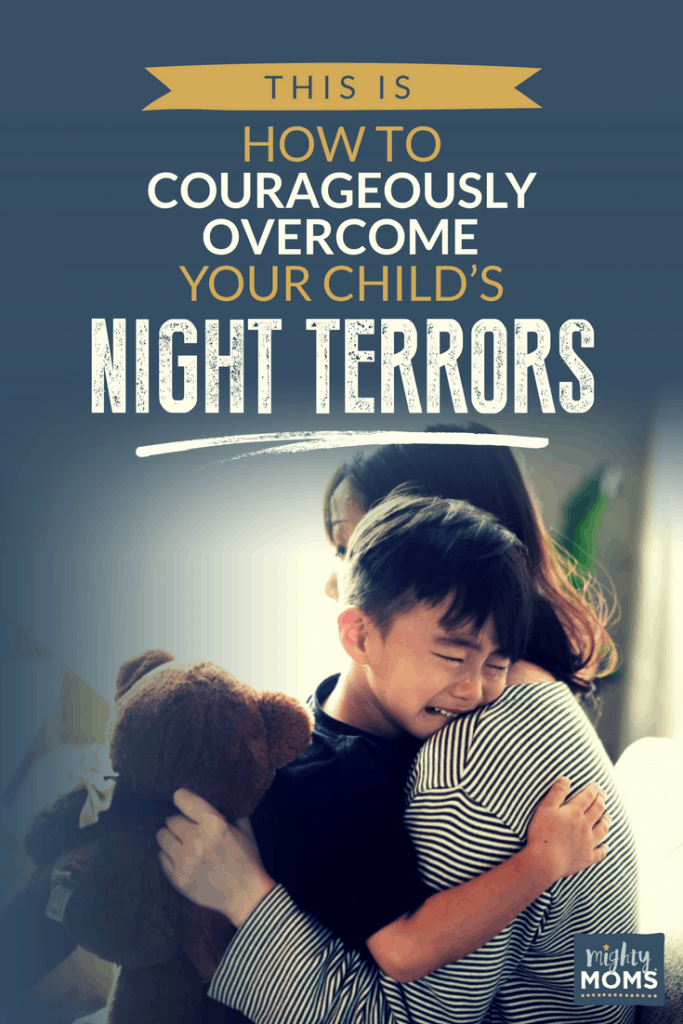It’s 10:30 pm.
You and the hubster are snuggled down into the couch, valiantly trying to stay awake long enough to get through a single episode of Parks and Rec on Netflix.
Suddenly, a blood-chilling scream shatters your tiny bubble of peace, sending you both into a panic as you untangle from the blankets.
Something TERRIBLE must be happening.
Your gentle mama’s heart is flirting with cardiac arrest. Both of you launch up the stairs in a flurry of arms and legs, reaching the offending bedroom at the same time. Your gallant man gently squeezes into the room first.
There’s your son. Standing in the middle of the room, eyes-wide, and screaming like a banshee auditioning for a heavy metal band.
He approaches like your son is a feral lion on the African plains. Slowly. Gently. Softly. “Hey, buddy…you okay?”
Nothing but screams.
Minutes pass. You try to hold him, but he’s as stiff as a board. Unconsolable. You’re crying, stressed out of your mind, trying to calm him down. Just when you’re about to call 9-1-1, he coughs, walks over to the bed, lies down, and falls asleep.
What was THAT?
Night Terrors:
The Nightmare’s Ugly Uncle
That, my friend, was what they call a Night Terror. Strangely enough, though, the “terror” is reserved all for you, because your little boy is actually still asleep. He’s not dreaming. In fact, in the morning, he’s not going to have any memory of this incident at all. (You get that pleasure all to yourself.)
I think I’m jumping ahead too fast. Let me clearly explain the differences between a Nightmare and a Night Terror.
You’ll Know It’s a Nightmare If…
- It happens in the latter half of the evening.
- Your child can respond to your comforts, and knows clearly who you are.
- He can explain what it was that frightened him (either right away or in the morning.)
You’ll Know It’s a Night Terror If…
- It happens in the first half of the evening, usually within 2-3 hours of your child falling asleep.
- Your child’s eyes are wide open.
- He doesn’t react to any of your attempts to soothe him, it’s almost like he doesn’t recognize you.
- It lasts between 5-15 minutes.
- He doesn’t remember it in the morning.
Night Terrors have been shown in studies to be more common in boys ages 5 to 7. There is also an increased chance when one of the parents has a history of sleepwalking.
Between 1% and 3% of all children will experience a Night Terror, and approximately a third of those children will also struggle with sleepwalking.
Night Terrors: What’s Really Going On
He’s actually still asleep. His brain is getting stuck going from non-REM sleep to REM sleep (deep sleep to light sleep). Since he’s stuck in this sleepy-state, you’re not going to be able to do much in the moment to calm him down.
The best thing you can do is hold on and let him ride it through. Yes, I know your heart wants to interact and soothe, but, as a Certified Gentle Sleep Coach, let me assure you that any intervention may lead to extending the episode. Remember, as traumatic as this is for you, he will have no memory of it (a small consolation, I’m sure).
The Warrior You’re Looking For
Your best fighting strategy to overcome a Night Terror is prevention. How do you implore this warrior to swoop in and save the night?
Two ways.
Preventing Night Terrors: Looking Closely at Bedtime
The first step is to take a look at your child’s evening routine.
- Is your child exposed to scary TV or video game programs? Even though Night Terrors are different than nightmares, it is suspected that they are triggered by the same neural activity—fear. Only in a Night Terror, your child doesn’t actually wake up.
- Is your child overtired at bedtime? Studies have should Night Terrors are linked with an over-tired brain. Track his sleep-time for a few days and compare it to sleep averages to see if he is getting the recommended sleep for his age. Most children over 6 months should have a bedtime around 7:00 or 7:30pm.
- Is your child taking any medication that could interfere with his sleep? Make sure you go over all potential side effects with your pediatrician, so you know what to watch for.
- Does your child suffer from childhood sleep apnea? More and more experts are thinking this is much more common than previously suspected!
If you are really struggling to help your child have better sleep habits at night, staying in his bed all night long, or getting a nap in the afternoon, we would love to help you. Amy and I are both Certified Gentle Sleep Coaches who specialize in helping parents create consistent, non-CIO gentle sleep plans that can work for your unique family. Click here to see how we can help.
Preventing Night Terrors: Using Smart Technology
Besides looking at your child’s nighttime patterns, there’s a new piece of smart technology that can also be really helpful.
It’s called the The Lully Sleep Guardian.
Remember how I mentioned that, in a Night Terror, the brain has gotten stuck between REM and Non-REM sleep? Well, Lully is perfectly calibrated to do something called “Scheduled Wakenings”. You place the device under the mattress, and it will gently shake to reset your child’s sleep cycle and skip over the “stuck” part, while you remain happily unconscious in bed.
8 out of 10 children drop their night terrors, and most of them in the first week of using the Lully Sleep Guardian, so if you’ve been working on bedtime and he’s still waking with screams, this is an excellent backup fighter!
Remember Your Silver Lining
The good news about Night Terrors, is that we, as parents, carry all the burden. Our kids are left blissfully unaware in the morning. That’s okay, because we’ve got strong shoulders.
Still, strong shoulders can get droopy after a while. So it’s best for everyone if we take a few precautionary steps.
- Make sure your child is getting the rest he needs to avoid getting overtired.
- Consider using an automatic wakeup device like Lully.
- Set your mind on this important truth: This really is hurting YOU, more than it’s hurting him.
Plug those ears, hold out your arms, shush and soothe the best you can, knowing he’s not rejecting you. He’s just still asleep.
He will never know how difficult this is for you.
But we do.
And we think this just proves what an awesome mom you really are. Well done.
Have You Read These Yet?
- How to Survive (and Actually Enjoy) the Toddler Years
- Save Your Quiet Time! How to Rescue It from the Dreaded Dropped Nap
- Boy Mom Alert: 7 Potty Training Mistakes to Avoid
- How to Make the Preschool Age Your Best One Yet
We ♥ honesty! This post contains affiliate links that provide extra money for our mutual coffee habits addictions. Click here to learn more. As an Amazon Associate I earn from qualifying purchases.
We ♥ Citations
How to Help Your Child Through Night Terrors. SleepLady.com
Night Terrors Resource Center. NightTerrors.org
Night Terrors: A Review of the Psychology, Neurophysiology, and Therapy. JAACAP.com
Sleep Terrors in Children: A Prospective Study of Twins. NIH.gov
Night Terror. ScienceDirect.com



